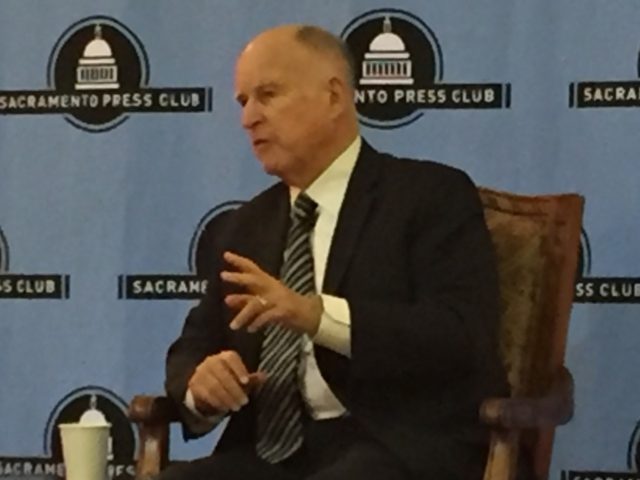SACRAMENTO, California — Jerry Brown told members of the media Tuesday that one of the most important lessons he had learned in his long political career was: “In politics you take care of your friends. Keep meritocracy within limits.”
Brown appeared before journalists for one of the last times as governor of California at a luncheon hosted by the Sacramento Press Club on Tuesday afternoon.
Standing ovation for @JerryBrownGov’s “exit interview” at @SacPressClub pic.twitter.com/BLeFZf6Plu
— Joel B. Pollak (@joelpollak) December 18, 2018
“There’s a lot of ranking and measuring,” he said skeptically, explaining his opposition to President Barack Obama’s policy of evaluating teachers, suggesting that personal criteria were more important to success in public service.
The club billed Brown’s appearance as his “exit interview,” and auctioned off autographed souvenirs of his political career — including, humorously, several of the famous graphs he used in his annual budget presentations, such as one showing that California reached record spending levels on his watch. (Brown, sportingly, signed the highest bar on the graph.)
The @SacPressClub is auctioning off signed @JerryBrownGov memorabilia. The current bid on this “Dreamer” license plate is $350. pic.twitter.com/0aG37SOkVw
— Joel B. Pollak (@joelpollak) December 18, 2018
Give @JerryBrownGov credit for a sense of humor: he signed the highest bar on this graph showing record spending in California under his administration. pic.twitter.com/RIRuaU1Z8R
— Joel B. Pollak (@joelpollak) December 18, 2018
The governor — ending a two-term stint and his fourth term overall — explained that he had tended to avoid holding weekly press conferences after watching his father, Gov. Pat Brown, hold conferences where seemingly innocuous statements were later held forth by journalists as proof that the governor had contradicted himself about something.
“I’m not here to make news. I’m here to enlighten you,” Brown joked.
Brown addressed questions from a panel — with some reluctance, calling a “lighting round” of questions a “mindless exercise.” He predicted that the recent federal court ruling declaring Obamacare unconstitutional would be overturned — and that, if it were not, Democrats would sweep into power in 2020.
Brown also said that he had enjoyed his many political campaigns because campaigning was a “group activity,” prompting laughter. He added that it was easy to volunteer for a political campaign — and to receive a political job as a result. “You don’t have to be fingerprinted, they don’t ask you what you’ve been convicted of.”
He credited “timing, circumstance, and luck” to success in politics, noting that he had been able to reinvent himself in 1980 as the leader who made Proposition 13 work — though he had campaigned against the measure, which restricts property tax increases in the state, when it was first proposed.
He said that he did not regret his unsuccessful runs for President, or for U.S. Senate, saying that losing gave him time off to enjoy “working for Mother Theresa and practicing Zen medication in Japan.” Winning for president would have been difficult, he said: “You gotta cultivate the establishment more than was my mood in the 1970s.”
Brown poked fun at the institutionalized hypocrisy of politics, where if elected officials give political donors what they want directly, they will go to jail, but if they do not give it to them at all, they will never be elected at all.
The governor reminisced about other episodes in politics, such as duck hunting with John F. Kennedy and Earl Warren, who served as governor of the state as well as Chief Justice of the U.S. Supreme Court.
Brown touted criminal justice reform, but defended his decision not to support ballot initiatives to end the death penalty — which he opposes — by saying that he felt it necessary to lead on some issues and not others.
“I think what I’ve done is made a very important impact on a lot of human beings,” he said, regarding prisons.
Asked to explain his proudest accomplishment, Brown said he considered pride a sin, and was more worried about the challenges facing the future, including “a nuclear war to avoid” and climate change. Eventually, he cited his budget surplus: “Having a lot of money instead of a $27 billion deficit.”
He predicted that California’s high-speed rail project would be built, as would his “twin tunnels” project to bring water from north to south. “The [California] Delta will be destroyed unless we have some kind of peripheral canal or a tunnel,” he said.
Joel B. Pollak is Senior Editor-at-Large at Breitbart News. He is a winner of the 2018 Robert Novak Journalism Alumni Fellowship. He is also the co-author of How Trump Won: The Inside Story of a Revolution, which is available from Regnery. Follow him on Twitter at @joelpollak.

COMMENTS
Please let us know if you're having issues with commenting.